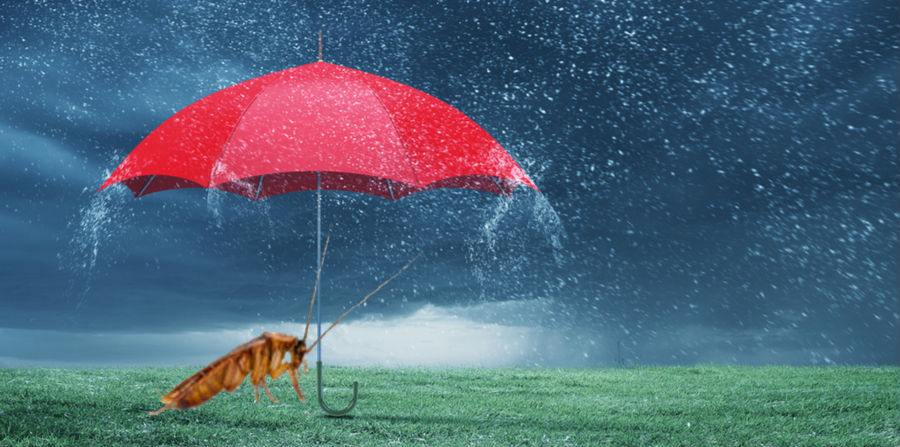Rain is a welcome change of pace in spring time, especially since it helps push away the winter grey. As you might expect of any meteorological change, however, rain can also be disruptive. Spring is a already a transitional time of year. Flora and fauna are struggling to adapt to the changing season. When rain disrupts this process, it can create some awkward circumstances.
The most unwelcome of these awkward circumstances would have to be the pests. When rain disrupts their behavior, all kinds of pests may end up in places where they wouldn’t normally be. Places like your home. Here’s what to expect from pests after a long rain, why, and how to react.
Cockroaches
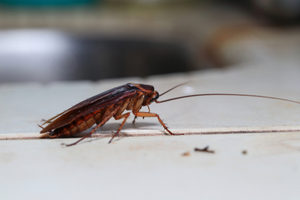 Cockroaches need moisture and humidity to stay alive, so they’re naturally attracted to moist and humid places. The problem is, the moist and humid places where they naturally congregate also tend to be vulnerable to flooding. Millions of cockroaches live in sewers, gutters, or drain pipes. When we get heavy rainfall in the spring, these places flood. Flooding forces cockroaches out of their homes and into new places – like your home!
Cockroaches need moisture and humidity to stay alive, so they’re naturally attracted to moist and humid places. The problem is, the moist and humid places where they naturally congregate also tend to be vulnerable to flooding. Millions of cockroaches live in sewers, gutters, or drain pipes. When we get heavy rainfall in the spring, these places flood. Flooding forces cockroaches out of their homes and into new places – like your home!
After periods of heavy rain, it’s common to find cockroaches in your kitchen, bathroom, or basement. These roaches are probably flooding refugees that snuck up your drains or through cracks in sills or frames. Once inside, roaches look for food, shelter, and moisture. They love to squeeze under tight hiding places like boxes and furniture, where they can hide until night time. Unfortunately, once cockroaches get inside, they’re in no hurry to leave. They’ll stick around as long as they have access to food and shelter.
Snakes
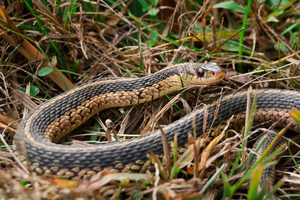 Snakes tend to come out after rain for several reasons. First, most snakes naturally live close to water. When rainfall floods the banks of rivers and streams, the snakes are forced to seek higher (and drier) ground. Snakes also have to come out after rain to warm back up. As cold-blooded reptiles, snakes rely on sunlight to keep their internal body temperatures up. After days of clouds and rain, snakes get desperate to get warm.
Snakes tend to come out after rain for several reasons. First, most snakes naturally live close to water. When rainfall floods the banks of rivers and streams, the snakes are forced to seek higher (and drier) ground. Snakes also have to come out after rain to warm back up. As cold-blooded reptiles, snakes rely on sunlight to keep their internal body temperatures up. After days of clouds and rain, snakes get desperate to get warm.
Particularly severe rainy conditions may even force snakes into your home. As dry shelter becomes less and less available, snakes have to get creative if they want to survive. They’ll twist and contort themselves to fit through small cracks and crevices to enter basements and attics. They may even follow other pest-refugees while they’re hunting and stumble into your home inadvertently. Unlike cockroaches, snakes don’t typically stick around after the rain stops, but you might find them in your yard nearby.
Spiders
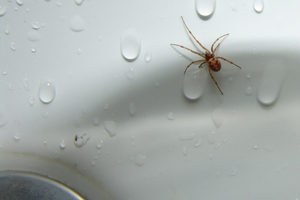 For most pests, heavy rainfall is a nuisance. While it can be a nuisance for spiders, too, it can also be an opportunity. The busiest insect hunters in the world aren’t about to stop their grind for a little rain. After all, the itsy bitsy spider wins out in the end, even in the nursery rhyme. They go where their prey goes, no matter what. That means, when it rains, they’ll follow their prey into your home.
For most pests, heavy rainfall is a nuisance. While it can be a nuisance for spiders, too, it can also be an opportunity. The busiest insect hunters in the world aren’t about to stop their grind for a little rain. After all, the itsy bitsy spider wins out in the end, even in the nursery rhyme. They go where their prey goes, no matter what. That means, when it rains, they’ll follow their prey into your home.
Spiders want to build their webs wherever they think they can catch prey. They’ll find the places where other pests get into your home – window sills, baseboard cracks, etc. – and set up shop there. Often times, spiders already living nearby during rain will move inside to follow prospective prey. Other times, their homes will get wiped out by flooding, just like their prey. Either way, expect to see more spider activity when it rains.
Termites
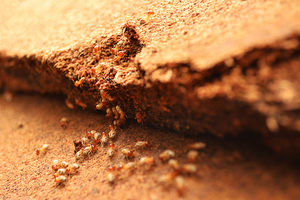 Everyone knows termites eat wood. What fewer people know is, ironically, termites are more attracted to moisture than they are to wood. When you think about it, it makes sense: eating wood has to be thirsty work. Termites need moisture to survive, just like everything else. If they get too dried out while they’re munching away at wood, they’ll die. Termites prefer to strike at wet food, so they can keep hydrated while they work.
Everyone knows termites eat wood. What fewer people know is, ironically, termites are more attracted to moisture than they are to wood. When you think about it, it makes sense: eating wood has to be thirsty work. Termites need moisture to survive, just like everything else. If they get too dried out while they’re munching away at wood, they’ll die. Termites prefer to strike at wet food, so they can keep hydrated while they work.
Obviously, all wood is wet when it’s getting rained on. During rainy periods, termites may seize the opportunity to attack wood sources that are normally dry. The wetter the wood, the easier it is for termites to chew through it. Rain is a great deal for termites–as long as they can survive it. Just like other pests, termites can easily drown in flooding. They may also target wood that lets them avoid this danger.
We know this is probably kind of a bummer. You were just looking forward to being done with winter, and now you have all this to worry about? Maybe April really is the cruelest month! Well, the good new is you don’t have to deal with it alone.
Give Griffin Pest Solutions a call any time you’re worried about a pest infestation. We can make sure your home stay pest-proof this spring and beyond. Rain or shine, Griffin has your back.

